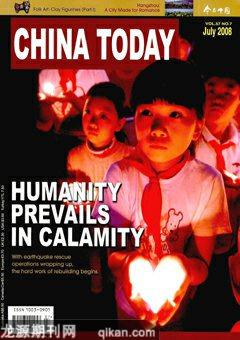Galloping Ahead
By LANCE MAUGHAN

DRAMATIC horsemanship and high speed made Tang Dynasty prosperity. Horsemanship has been inherited to become a fashion sport.” Though grammatically dubious, the slogan, written in English and Chinese, sums up the mission of the Qingdao Deray Riding Club. This flashy new equestrian club in Jimo City, an industrial hinterland of Qingdao, the prosperous seaside metropolis of Shandong Province, consciously evokes Chinas equestrian past to solicit business from todays socially mobile elite, for whom riding is the epitome of class and sophistication.
The clubs buildings, which are barely distinguishable from the rest of the boxy industrial units surrounding it on Culture Road, were completed and opened for business in December 2006. Currently, Deray claims to be the largest equestrian center in Shandong Province.
That is an entirely believable claim: club stables and arenas sprawl over 30,000 square meters, while a comfortably spacious reception area and teahouse overlooking the main indoor arena is hung with photos of Zou Jingqing, the portly, smiling entrepreneur who built Deray with RMB 20 million of a fortune made off his Qingdao Deray Construction and Decoration Co., Ltd.
Zou modeled Deray on equestrian clubs he visited in France and Germany. “I learned a lot from French horse experts in particular,” he said. “Equestrian competition and culture are extremely professional in France,” said Zou, who wants to add more European thoroughbreds to his stable of 30 horses.
So far, Deray riders use retired horses, imported from Hong Kong by agents in south Guandong Province. Professional riders using the club ride European horses, relying on a mix of thoroughbreds and draft horse breeds, whose calmer temperaments are more suited for the arduous equestrian sports of jumping and dressage.
For Zou, a keen rider who happily trades in the tight jodhpurs of English-style riding for the loose moccasins of American Western-style riding, Deray is the fulfillment of a boyhood dream. “Horseback-riding is my passion. I really love it. When I was young, I always longed to ride horses, but living conditions at the time did not allow me to do that. Then, I started my own business in construction and decoration, which provided me with enough money to go to big cities like Beijing and Shanghai. There, I visited horse clubs and had a lot of fun. I was thinking even then of setting up such a club in Qingdao, which did not yet have one.”
Chinas rising wealth means there is money to be made off equestrian sports, said Zou. Local executives are swapping saunas and massage bars for the saddle. “I see great commercial potential in this horseback-riding field with the economic development of China,” said Zou. Health, fashion, and relaxation are the company credos, as promised on various banners hung around the stables and arena. “Deray is the right place for a holiday,” proclaimed one. The slogan refers to the hotel and KTV complex which Zou said he plans to have operational by the end of 2008.
Deray is the only club in Shandong Province with an arena that meets international standards. Riding there is not for those with shallow pockets. Non-members have to pay RMB 320 for one hour on a foreign horse, but the club also owns half a dozen horses of the Yili breed, indigenous to western China. This visiting writer got to ride a New Zealand stallion, the best horse in the house I was assured by the very friendly staff.
The club was empty aside from a lone teenage member stabling her horse after an hour-long session. “As a club member, you will feel nobly and valued, as well as wealthy,” read the brochure prepared for prospective members. Ten lessons on a student card cost RMB 2,400 (50 lessons cost RMB 9,500 and RMB 16,000 for 100 one-hour sessions with horse and trainer).
Horse owners can stable their steeds for RMB 30,000 per year, including a feeding fee of RMB 24,000 and a training fee of RMB 6,000. VIP cards at RMB 48,000, and platinum cards for RMB 68,000, give you “no limit of time for horsing through the whole year,” as well as discounts on rooms and meals at an on-site hotel planned for the club. Platinum card members also get first refusal on buying club horses. A “horse leading” course costs RMB 200 per hour – you learn how to walk with your horse, said the club receptionist.
Zou said he wants to make Qingdao a center for horsemanship – and an international base for horse competition. Though Deray claims to be the only club of its kind in Qing-dao, a wave of equestrian clubs has opened across Chinas wealthier cities. Beijing and Shanghai both have several clubs accredited by Hartbury College, a leading U.K. equestrian education and examination center. Centers draw instructors from among Chinas Mongolian and Uygur minorities, both of whom have vibrant horse cultures. Several of Derays instructors were hired from among a handful of skilled competitive ethnic-Mongolian riders working in Beijing clubs.
Horse ownership has increased dramatically in China, according to James Sun, chief executive of Horse China, a marketing agency which imports horses for local buyers. Retired race horses from tracks in Hong Kong and Macao cost less than warm bloods imported from Europe, but may take longer to retrain. Locally bred Yili horses, a hardy breed from Chinas far western border with Kazakhstan, are too short for professional competition in equestrian sports such as show jumping, explained Sun.

